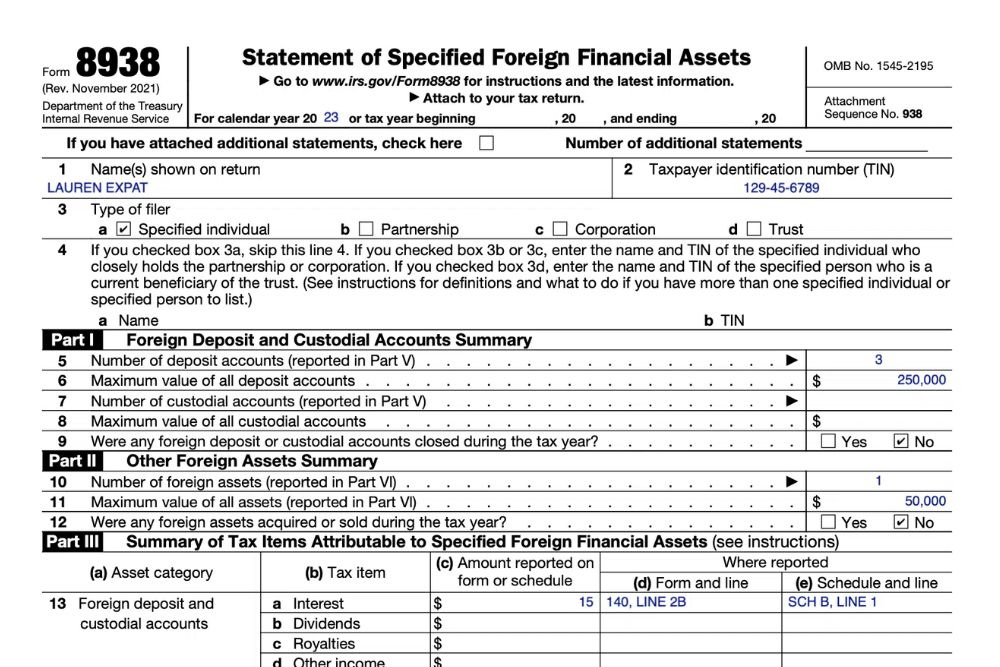FATCA Reporting 101

US taxpayers who own foreign financial assets valued over certain thresholds must report them to the IRS annually on a FATCA report, which is done via IRS form 8938.
Key Takeaways
- If you haven’t filed a FATCA report when required, an IRS amnesty program to become compliant without the usual fines may be your best course of action.
- FATCA requires US citizens to report their foreign assets if they exceed certain thresholds.
- Failing to file a FATCA report when required can result in severe penalties.
FATCA Reporting Requirements
The Foreign Account Tax Compliance Act (FATCA) is a set of laws designed to stop taxpayers from evading taxes by hiding their money and assets offshore. Under FATCA regulations, US persons who own foreign financial assets valued over certain thresholds must file Form 8938 to report them.
FATCA Tax Reporting Thresholds
FATCA reporting requirements vary based on your filing status and whether you live outside of the US. You can find the thresholds in the table below.
| Filing Status + Residency | Must file if they own… |
| Single taxpayers living in the US: | $50,000 in specified foreign financial assets on the last day of the tax year or $75,000 at any point during the year. |
| Married taxpayers living in the US: | $100,000 in specified foreign financial assets on the last day of the tax year or $150,000 at any point during the year. |
| Single taxpayers living abroad: | $200,000 in specified foreign financial assets on the last day of the tax year or $300,000 at any point during the year. |
| Married taxpayers living abroad: | $400,000 in specified foreign financial assets on the last day of the tax year or $600,000 at any point during the year. |
What Are Specified Foreign Financial Assets?
FATCA reporting thresholds are based on the value of your specified foreign financial assets. Broadly speaking, “specified foreign financial aspects” mean:
- Financial and investment accounts held with foreign financial institutions
- Direct holdings in non-US stocks or securities
- Interests in foreign entities, such as foreign partnerships and foreign trusts
- Interests in foreign pensions or deferred compensation plans
This can include a wide variety of foreign assets, such as:
- Foreign bank accounts
- Foreign pensions
- Foreign stocks and securities
- Foreign partnership interests
- Foreign mutual funds
- Foreign-issued life insurance
- Foreign hedge funds
- Foreign real estate held through a foreign entity (you don’t need to report the real estate itself, but the foreign entity itself is a specified foreign financial asset, and its maximum value should include the value of the real estate.)
Determining whether an asset counts as a specified foreign financial asset can be complex. Consult a qualified expat tax professional like Greenback Expat Tax Services to learn the details of your case.
There are no penalties for reporting items that do not need to be included on a FATCA report—only for leaving items off. When in doubt about whether an asset qualifies, the safe option is always to report it. You won’t lose anything by including too many assets!

Exceptions to FATCA Reporting
There are a number of exceptions to FATCA reporting requirements. First of all, your foreign home owned in your own name does NOT need to be reported or included when calculating your specified foreign financial assets.
In addition to that, you won’t need to report any assets that have already been reported on another form. This may include:
- Trusts and foreign gifts reported on Form 3520 or Form 3520-A
- Foreign corporations reported on Form 5471
- Passive foreign investment companies reported on Form 8621
- Foreign partnerships reported on Form 8865
- Registered Canadian retirement savings plans reported on Form 8891
Penalties for FATCA Form 8938 Non-Compliance
Failing to file a FATCA report when required can result in severe penalties, including:
- $10,000 fine per violation (i.e., for each form not filed per year)
- Up to $50,000 for continuing to not file after being notified by the IRS of the filing requirements
- 40% penalty on any underpayment of “tax attributable to non-disclosed foreign financial assets”
If you are behind on your FATCA reporting obligations, there are tax amnesty programs available. The most popular option for expats is to file under the Streamlined Filing Compliance Procedures. Using this program, you can catch up on your delinquent expat tax forms without having to pay the usual penalties.
Best of all, there are only a few restrictions on filing under this program. The most important requirement is to self-certify that your failure to file was due to ignorance, not willful refusal.
But don’t wait too long! If the IRS contacts you about your failure to file before you start the Streamlined Filing Compliance process, you may lose the right to amnesty and face severe penalties. Get started right away!
Some expats try to fix their delinquent tax forms through a “quiet disclosures” approach. This means filing delinquent taxes without directly informing the IRS that you were delinquent—a requirement of using the Streamlined Filing Compliance Procedures. We strongly recommend against this. If the IRS realizes what you are doing and contacts you about it, you will be ineligible for amnesty.
Get Help with Your FATCA Reporting from Greenback Expat Tax Services!
We understand — FATCA reporting can get complicated quickly. Fortunately, you don’t have to figure it out on your own! Greenback can help you file Form 8938 and avoid the usual penalties for non-compliance.
If you’re ready to be matched with a Greenback accountant, click the get started button below. For general questions on expat taxes or working with Greenback, contact our Customer Champions.
FATCA Reporting FAQs
What Is FATCA Reporting?
FATCA (Foreign Account Tax Compliance Act) reporting requires US taxpayers with specified foreign financial assets above certain thresholds to report them to the US Treasury using Form 8938.
Who Needs to File Form 8938?
US persons who own foreign assets exceeding the reporting thresholds must file Form 8938. The threshold will vary based on your filing status and residency.
Can I Avoid Penalties if I’m Behind on FATCA Reporting?
Yes, you can use the IRS Streamlined Filing Compliance Procedures to catch up on delinquent filings without penalties, provided your failure to file was not willful.
Why Should I Avoid “Quiet Disclosures” for FATCA Reporting?
“Quiet disclosures,” or submitting delinquent forms without notifying the IRS, can lead to losing eligibility for amnesty programs and facing severe penalties. It’s recommended that the proper compliance procedures be used.



